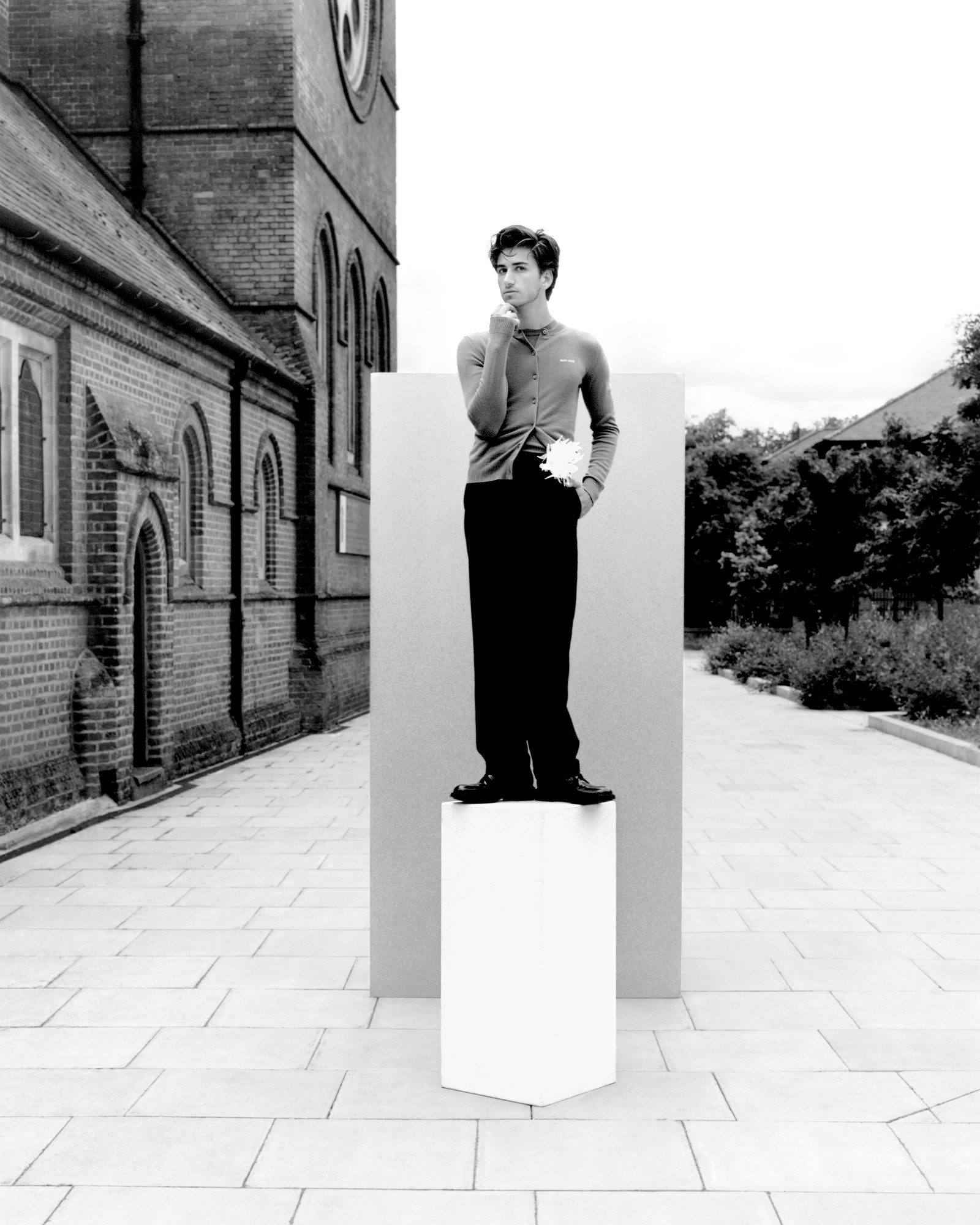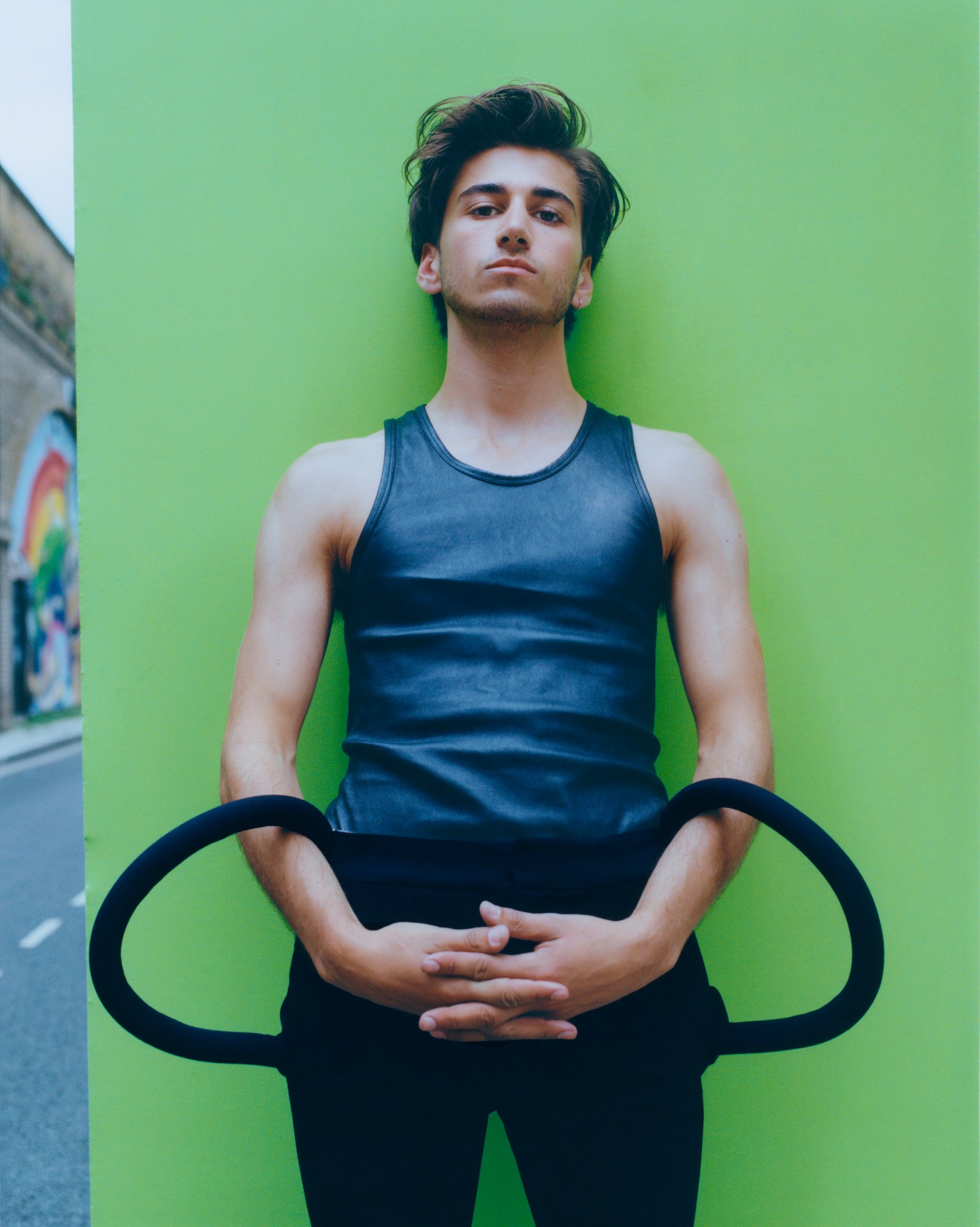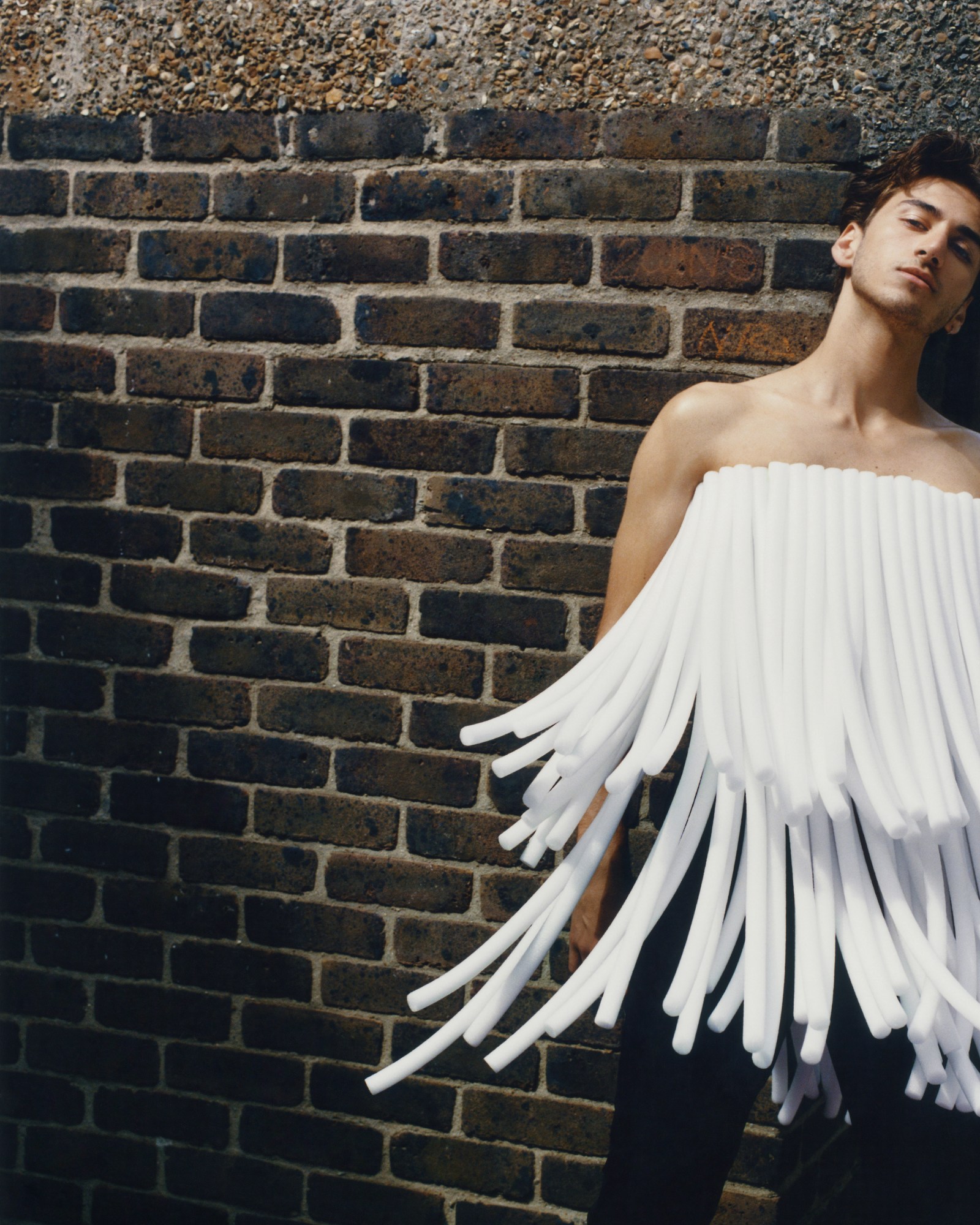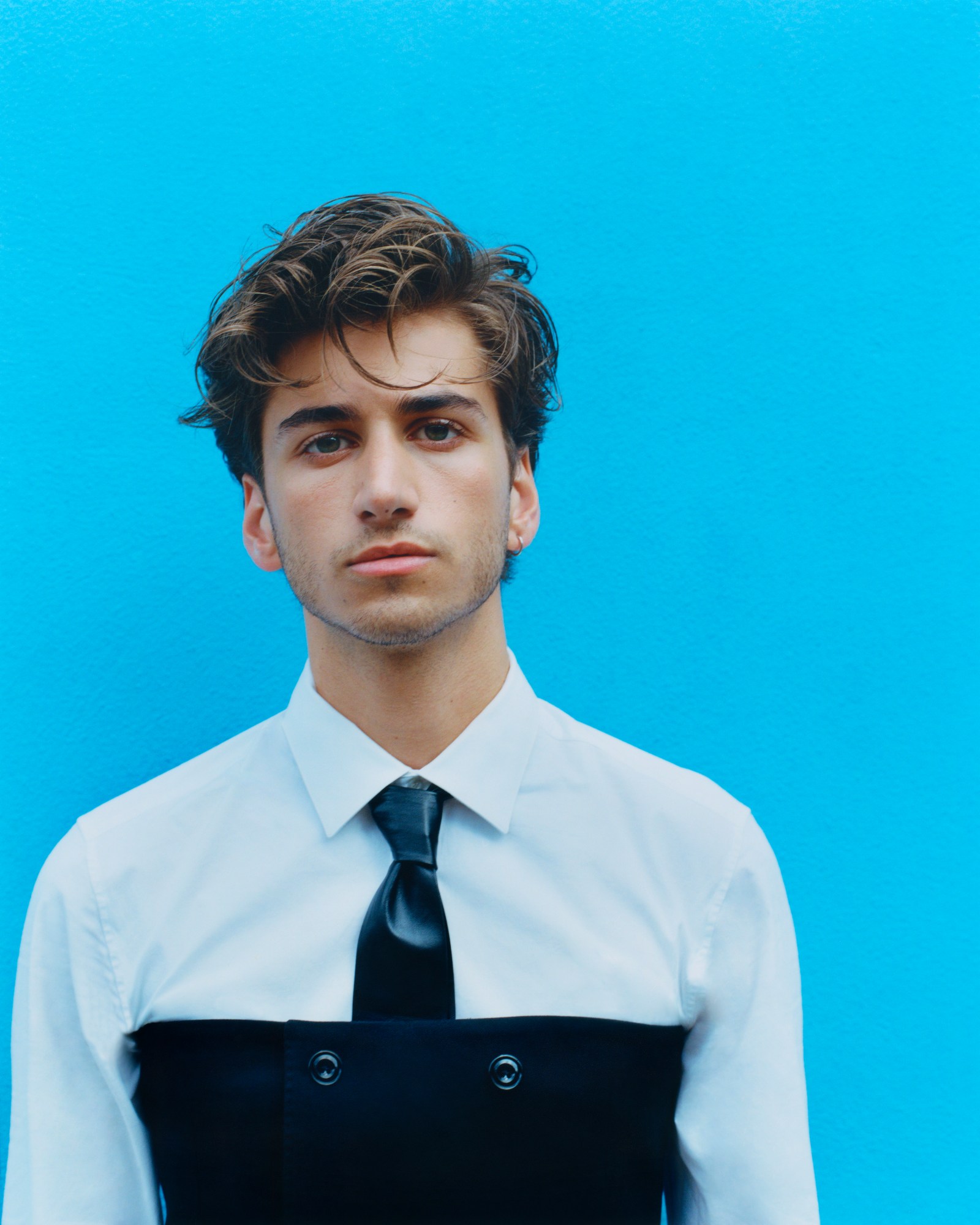Sebastian Croft has a tiny red Moleskine notebook that he writes in every day. It is scrawled with notes and reflections on what his life looks like; with song lyrics, sketches and things he feels grateful for. The actor who, at 22, has spent well over half of his life on stage and screen, started journalling last summer. His life was moving quickly: although he’d appeared briefly in shows like Game of Thrones, and played the lead role in children’s films, he had reached an unexpected and overwhelming level of cult fame.
It was due to his role in Netflix’s Heartstopper, the juggernaut queer teen drama based on the graphic novels by Alice Oseman. Days after the show premiered in 2022, Sebastian’s Instagram follower count ballooned from 95,000 to over one million. Today, that number is over two million. Those eyeballs have helped take him to Paris Fashion Week dressed in outfits by his stylist Harry Lambert (who is the architect of Josh O’Connor and Harry Styles’ red carpet looks, and also styled this i-D shoot), as well as to unexpected corners of the globe where massive Heartstopper fan communities have sprung up, like Brazil. Throughout it all, the notebook grounded him. Aside from his friends and family, it’s the one thing he’d save from a burning building. “I’m terrified of losing that book,” he says.
Sebastian and I are catching up just as summer announces itself in London. But I actually first met the actor this time last year, days before the SAG-AFTRA strike. He recalls how when the strike first started, it “[felt like] when someone pulled a fire alarm at school…it was kind of nice not to be worrying about [there being] no work. Everyone could take a second.”
Back then, he was gearing up for the launch of the second series of Heartstopper, in which he plays Ben, the antagonistic ex-love interest of the show’s softer lead Charlie (Joe Locke). But he was also simultaneously dealing with the reality of what followed it. Ben was to leave the show in that series’ penultimate episode, becoming the first of the central characters to move on to new things. “I know I was spoiled with Heartstopper,” he said then, “because it was fulfilling and challenging as an actor, but it also felt personally important to me as a story to tell. It will probably be a while before I have something that fills that many boxes.”

And so, Sebastian found himself in a slight limbo state, saying goodbye to the show that changed everything. He had an idea of what he’d like to do, and a handful of projects lined up, but when you’ve been acting for as long as you can remember, and have become famous for playing a kid, how do you segue into a world that treats you like the adult you are?
“In the last six months, I’ve felt less of a connection or an affinity to teen stories,” he says. Save for How to Date Billy Walsh, a twee Prime Original high school comedy that had its release shifted to the Spring by the strike, his post-Heartstopper projects all have a grown-up edge to them. His next film Get Away is an indie horror-comedy shot on a remote island in Finland. Written by Shaun of the Dead’s Nick Frost, who Sebastian had previously worked with on How to Date Billy Walsh, the film follows a family on a quaint Scandi getaway who realise the island they’re visiting is home to a serial killer stalking their every move. For two months during filming, it was just the film’s crew who occupied the island, and they “were all in the trenches together.” After a few months of professional silence owing to the strike, Get Away “healed something in my soul,” Sebastian says. It reminded him of a career pre-fame, of making something smaller: an independent film with a modestly-sized and tight-knit cast and crew. It’s set to premiere at Fantastic Fest later this month ahead of a December release in the U.S.
After Get Away wrapped, he went to Wales to shoot Dope Girls, a 1910s-set BBC drama based loosely on the true story of the birth of London’s underground nightlife scene, also due for release later this year. Told from the perspective of the working women who plunged themselves into this new world after World War One ended, the project is being led by Babyteeth director Shannon Murphy, The Neon Demon’s screenwriter Polly Stenham, and the production company behind Industry. As might be expected from that line-up, it’s an “un-classically period” piece, according to the actor. “Other than the costumes, it kind of could be set today.”
It’s also a gearshift from the often cotton-wooled world he’d come from. Over email, Shannon Murphy says that she chose Sebastian to play Silvio Salucci, a 30-year-old pimp, because she “likes to avoid [casting to] stereotypes.” To lean into the character, who runs restaurants and secret nightclubs around central London, Sebastian worked with a movement coach and would dine at Soho’s Italian restaurants with his co-stars. When he wasn’t in front of the camera, he’d sit behind it, “to watch whatever Shannon was doing.” He calls this “school mode.”












“I’m not going to wait for the perfect thing to land in my lap. I’d rather get up and start making it.”
Sebastian’s departure from Heartstopper happened at the right time, he says. In his final scene, the closeted and repressed Ben – who earlier kissed Charlie against his will – asks Charlie for forgiveness, but doesn’t get it. Sebastian is proud of how that character arc rounded out, and had spoken of his exit at length about with Alice. But still, the fans miss him as part of the gang: in the comments on his TikTok account, they’re sad about his departure. Now, he too, he says, is “sad not to be seeing [the Heartstopper cast] every day.” He’s anticipating the weird feeling when Season Three is released this October: “like I’m leaving school and all my friends are still [there], and I’m knocking on the window.”
“I worked really hard at the work that I have [done],” Sebastian says. “But I also want to be brave [and] push off in a different direction, which I think is scary.” He knows that preconceived ideas will follow former child actors, whether they like it or not. “I think it is hard sometimes when you’ve started doing one thing to go out of your comfort zone again, because it’s so hard to find any space where you feel safe.”
He describes Heartstopper as progressive both on-screen and off; he remembers how queer, how welcoming that first day in the rehearsal room felt. Before shooting it, “I’d had an experience on a [different] set where someone had been quite openly homophobic,” he says – a passing remark that no one seemed to acknowledge – “and I felt so uncomfortable.” That reminder that homophobia is still commonplace, something too often shrugged off as banter, is part of the reason why Sebastian launched the organisation Queer Was Always Here in 2022 with his friend, the actor Connor Jessup. It raises money for queer refugees via the charity Choose Love and educates younger people on LGBTQ+ history.
Sebastian has been drawn to drama ever since he was a child. Growing up in a market town near Oxford, the son of a Greek-Cypriot mother and English father, his childhood was split between the rigidity of his school life and the expressiveness of performing. “I had so much energy,” he says, “and I was putting on these plays at home, and my parents were like, ‘Go and do something with it.’” At seven years old, they sent him to weekend classes at Stagecoach, a popular drama programme for kids, where he found his people. “There, all the things that I felt almost annoyed at myself for being in every other area of my life suddenly were just celebrated.” After bargaining with his dad to take him to open auditions for musicals in London every other Sunday, he scored roles in Chitty, Chitty, Bang, Bang, Oliver!, Les Miserables and Shakespeare’s King John (Ginny Schiller, the production’s casting director, recalled to me how the 14-year-old had “an amazing command of Shakespeare’s text… better than many a trained actor”).

Dope Girls and Get Away may be Sebastian’s stepping stones towards the work he wants to be doing. His Heartstopper co-stars are now starting to make similar moves: next year, Kit Connor, who plays Charlie’s bi rugby player boyfriend Nick, will play a soldier in Alex Garland’s Warfare; the supporting actor Rhea Norwood is currently playing Sally Bowles in a West End production of Cabaret.
Sebastian is also working on a script for a queer-themed film which he’s been toiling away on since the pandemic. “I didn’t think writing was necessarily on the cards,” he says. “I’m super excited about the possibilities that are out there as an actor, but equally, I’m not going to sit and wait for the perfect thing to land in my lap. I’d much rather get up and start making it.”
For a forthcoming biopic of a gay artist shot by an American first-time director – he is keeping finer details under wraps – Sebastian went to Florence and wandered around its galleries, taking in work by artists like Caravaggio. “I feel so lucky to be able to be in the room for stuff that, for so long, I just felt like I was fighting to even get a chance [for],” he says. The film is partly inspired by Jean-Paul Sartre’s Being and Nothingness. “It asks what it is to be lonely and what it is to exist,” he says. There’s a chance that the film, like many that were knotted up in strange contracts during the strikes, might not see the light of day, but the process alone has been illuminating: an excuse to dive headlong into something new.
The notebook is still an important part of his daily routine. “Sometimes in the momentum of life, we go from thing to thing, and you end up forgetting to appreciate the basic stuff,” he says, and so he’s still scribbling in it: drawings of flowers, recollections of the way an old person (at this point, maybe the last demographic who sees him as an average young lad, not a celebrity) smiles at him in the street. He says that is as important to him as the promise of a career. “I’m making sure I still have a fulfilled life, regardless of external validation or success or love,” he says. “For as long as people love me or hate me, or for as long as I’m working or as long as I’m not, I need to be able to love myself and feel fulfilled outside of that.” He recites a line of poetry to me from “If” by Rudyard Kipling, that he finds himself living by. “Meet with Triumph and Disaster,” he says, “and treat those two imposters just the same.”
Photography: Naguel Rivero
Styling: Harry Lambert
Grooming: Liz Taw
Set Design: Julia Dias
Assistant Styling: Ryan Wohlgemut
Photography Assistance: Arthur Miller Radnall
